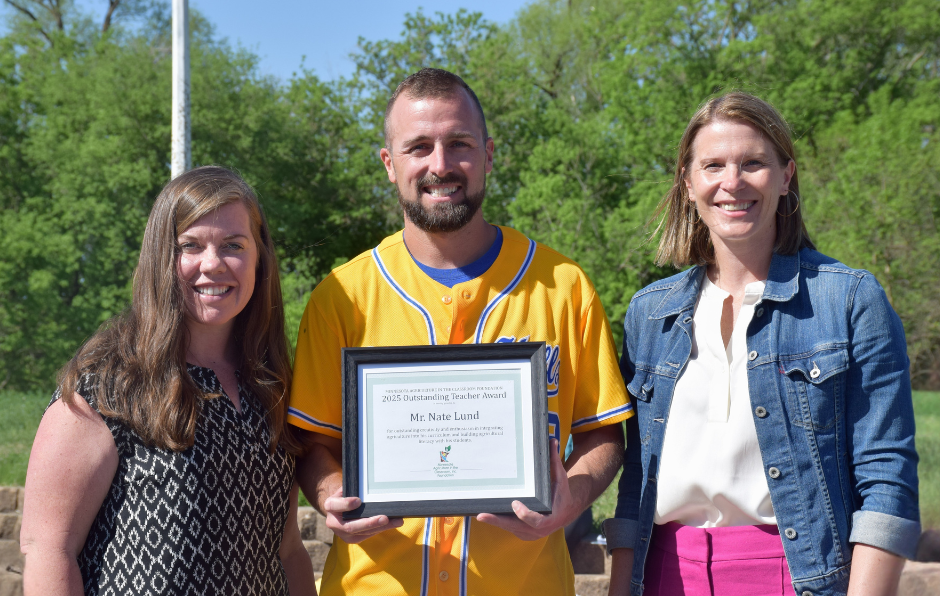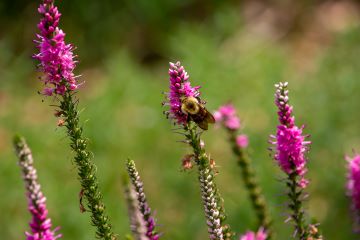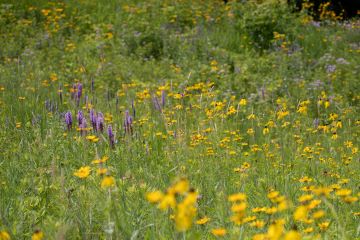The Minnesota Department of Agriculture (MDA) has announced its recipients of the 2025 Noxious Weed and Invasive Plant Grant. Thirteen projects totaling $150,000 were awarded though the grant.
The money, awarded to cities, counties, townships, conservation districts, and Tribal Nations, will be used to purchase equipment and supplies, conduct mapping and outreach activities, and hire private applicators to manage noxious weeds.
Up to $15,000 was awarded to each recipient to be spent in one year.
The MDA has awarded over $1,700,000 since 2017 to local municipalities and tribal nations for projects that focus on noxious weeds throughout the state. These grants provide local communities with funds to perform essential noxious weed and invasive species work that otherwise may not be completed. The projects help communities take steps towards healthier local environments.
| Organization | County | Award Amount | Project Title |
|---|---|---|---|
| Anoka Conservation District | Anoka | $15,000 | Anoka County Noxious Weed Management |
| Becker Soil and Water Conservation District | Becker | $9,000 | MDA Noxious Weed Grant 2025 |
| Burnhamville Township | Todd | $1,045 | Parsnip weeds |
| City of Columbia Heights | Anoka | $4,000 | Columbia Heights Community-based Invasive Plants Management |
| Hubbard County | Hubbard | $11,783 | Brown Knapweed 2025 |
| Norman Soil and Water Conservation District | Norman | $15,000 | Noxious Weed and Invasive Plant Grant FY 2025 |
| Prairie Island Indian Community | N/A | $11,000 | FY 2025 Noxious Weed Management |
| Scott Soil and Water Conservation District | Scott | $15,000 | Scott CWMA FY2025 |
| St. Louis County | St. Louis | $15,000 | SLC Continues the Fight Against Knotweed and Parsnip |
| Todd County | Todd | $15,000 | Preventing Palmer Amaranth Spread |
| Wadena Soil and Water Conservation District | Wadena | $10,500 | 2025 Wadena Noxious Weed Financial Assistance Project |
| Washington Conservation District | Washington | $15,000 | Emerging Invasive Species in Washington County 2025 |
| Wright County | Wright | $15,000 | Roadway Mapping and Treatments |
###
Media Contact
Brittany Raveill, MDA Communications
651-201-6131
Brittany.Raveill@state.mn.us
The Minnesota Department of Agriculture (MDA) is proud to announce the winners of the 2025 Minnesota Grown Cream of the Crop Awards for Farm to School and Early Care. This new contest recognizes K-12 school districts, early care centers, and family day cares that go above and beyond to promote and serve foods grown and raised by Minnesota farmers and producers.
This year’s winners have earned the title of Cream of the Crop in their respective categories:
- School District of the Year: Minneapolis Public Schools
- Family Daycare of the Year: Little Skeeters Daycare (Bagley, MN)
“Minnesota continues to lead the way in farm to school, creating stronger connections between local farms, classrooms, and communities.” says MDA Commissioner, Thom Petersen. “We’re proud to recognize the schools and early care providers that are making local food a vital part of how we nourish students and invest in resilient local economies that support small family farms.”
Applicants were asked to share details about their local purchasing practices, how they promote and educate students about local foods, and how they engage with the broader community through events and activities. In their application, Cream of the Crop School District of the Year winner, Minneapolis Public Schools, highlighted their long-standing commitment with farm to school. “We have sourced farm-direct items from hundreds of producers since our program began in 2013. We anticipate spending more than $500,000 on Minnesota-grown produce, grains, beans, and proteins again next school year. This locally grown food is served in entrées, sides, and salad bars in more than 60 cafeterias throughout our district.”
Farm to School programming reaches beyond K–12 classrooms, extending into early care and family day care centers across Minnesota. Merry Charles, owner of Cream of the Crop Family Daycare of the Year, Little Skeeters Daycare in Bagley, MN, said that “children in my daycare learn everyday about good nutrition. They plant and grow all their own vegetables and this year we will be planting fruit trees. We make jams, jellies, and they freeze all the vegetables that we grow.”
In addition to the top awards, several schools and daycare providers were honored with Outstanding in the Field recognition at three levels:
Golden Drumstick Honors
- ISD 196 – Rosemount-Eagan-Apple Valley
- Mesabi East School District (Aurora, MN)
- Northwestern Minnesota Juvenile Center (Bemidji, MN)
- Roseville Area Schools
- Love and Laughter Family Child Care (Anoka, MN)
Silver Squash Honors
- Foley Area Schools
- Holy Rosary School (Detroit Lakes, MN)
- Cannon Falls Area Schools
Bronze Berry Honors
- White Bear Lake Area Schools
- Winona Area Public Schools
- Holdingford Public Schools
Winners of the Minnesota Grown Cream of the Crop School District and Family Day Care of the Year will each receive exclusive rights to use the Minnesota Grown Cream of the Crop branding for the award year, along with a commemorative plaque. Outstanding in the Field honorees will receive exclusive rights to use the Minnesota Grown Outstanding in the Field branding for the award year and a signed certificate. To learn more about the Cream of the Crop Awards, visit the contest website.
Minnesota Grown is a program of the MDA to promote products grown and raised in Minnesota. The program has connected consumers with local farmers, farmers’ markets, and other producers of agricultural products for over 40 years. Development of the Minnesota Grown Cream of the Crop Awards was supported by a Patrick Leahy Farm to School Grant from the USDA.
###
Media Contact
Nikki Warner, MDA Communications
651-238-7909
Nikki.Warner@state.mn.us
July Food Safety and Defense Task Force Meeting
The Governor's Food Safety and Defense Task Force has continuously met since 1990 to discuss issues affecting Minnesota's food system. The Task Force is composed of seventeen members, ten of whom are appointed by the Governor's office, representing food regulatory agencies, agricultural industries, food-related non-profit associations, and the University of Minnesota. Meetings of the Task Force are held every other month and are open to anyone interested.
Task force meetings are held in conformance with Minnesota Statutes Section 13D.015, upcoming meetings of the FSDTF have been scheduled and will be offered in-person with video-conference phone-in options.
The next meeting will be on April 15, 2025, at the Orville L. Freeman Building in St. Paul, Minnesota.
Attend the July 21 meeting using Microsoft Teams
Or you can call in via audio conference (sorry, this is not a toll-free line) by calling: +1-651-395-7448
Phone Conference ID: 270 115 901#
Individuals with a disability who need a reasonable accommodation to participate in this event please contact Natasha Hedin at 612-247-5888 or through the Minnesota Relay Service at 711 as soon as possible.

Minnesota Agriculture in the Classroom (MAITC) is proud to announce Nathan Lund of Glacial Hills Elementary in Starbuck, MN as the recipient of the 2025 Outstanding Teacher of the Year Award. This honor recognizes K-12 educators in Minnesota who creatively integrate agriculture concepts into their classrooms.
Lund has taught 5th and 6th grade at Glacial Hills Elementary since 2021. With his support, students in his class have gained a deeper appreciation for agriculture and the environment through hands-on learning experiences. These include starting and maintaining a schoolyard garden, incorporating hydroponic systems in the classroom, restoring native habitats around the school grounds, canning tomatoes from the garden, and hosting food-making contests. In addition, Lund launched a school-wide composting initiative with his students actively leading the effort each year.
“We were so impressed by the many ways Mr. Lund and his students are working with their community—whether it’s building outdoor learning spaces or participating in local environmental initiatives,” said Sue Knott, Education Specialist with MAITC, a program of the Minnesota Department of Agriculture (MDA). “It’s clear he is creating a lasting impact in both the classroom and throughout the broader community.”
Reflecting on his work, Lund shared “Witnessing students’ transformation into proactive environmental stewards over the past four years has been incredibly rewarding. It has reinforced my belief in the power of experiential learning to inspire real-world change and has motivated me to continue integrating environmental education and agriculture into our curriculum.”
Lund credits programs like Ag in the Classroom, Lettuce Grow, Action for Healthy Kids, and Farm to School with helping him to bring authentic agriculture experiences into the classroom. “Through all of these different experiences, it is my goal to give students many opportunities to build life skills and a love of life-long learning and growing,” says Lund.

All licensed Minnesota K-12 educators who creatively integrate agricultural into non-agricultural subjects are eligible for the MAITC Outstanding Teacher of the Year Award. As this year’s winner, Lund will receive $500 plus support to attend the National Ag in the Classroom Conference taking place in Minneapolis, MN, June 23-26.
MAITC is a partnership between the MDA and the MAITC Foundation that seeks to increase agricultural literacy through K-12 education. For free educational resources and to learn more about the Outstanding Teacher of the Year Award, visit the MAITC website.
###
Media Contact
Nikki Warner, MDA Communications
651-238-7909
Nikki.Warner@state.mn.us
Governor Walz today signed Chapter 34, House File 2446, the Agriculture and Broadband Development Policy and Finance Bill, into law. The bill funds the Minnesota Department of Agriculture (MDA), Minnesota Board of Animal Health, and the Agricultural Utilization Research Institute.
“We worked closely with lawmakers throughout the session to craft a bill that invests in Minnesota agriculture and our farmers and ranchers,” said Agriculture Commissioner Thom Petersen. “The bill also provides food to those in need, supports mental health and farm safety resources, and protects our natural resources. It is a major win for our ag community and sets us all up for success now and into the future.”
Highlights of the bill include a new state level Local Food Purchasing Assistance (LFPA) Program ($700,000 per year, Fiscal Years 2026-2029 (FY26-29)). This fills in for a federal LFPA program that was terminated in March. The program has been widely successful in helping emerging farmers build markets and providing healthy and culturally appropriate food to food shelves around the state.
The bill also increases funding to the Farm to School and Early Care Program (an additional $550,000 for a total of $1.594 million in FY26 and $1.544 million in FY27). A federal award for the Local Food for Schools program was also terminated in March. This funding will help offset that loss of federal funds.
There is a onetime increase of $1.5 million in funding to the Ag Emergency Account in FY26. The account helps the state respond to agricultural disasters and animal diseases like avian influenza. New funding is also available for the Protect Grants, specifically for avian influenza ($400,000 in FY26/27).
The AGRI Meat, Poultry, Egg, and Milk Processing Grant will see an additional $100,000 for a total of $600,000 in FY26/27. This grant helps with the start-up, modernization, or expansion of meat, poultry, egg, and milk processing businesses. Processing bottlenecks in the wake of the pandemic highlighted the need for this support in the food supply chain.
The ag bill increases funding to the Farm Down Payment Assistance Program (an additional $500,000 for a total of $2.5 million in FY26/27). This grant helps qualified farmers purchase their first farm. The amount of each award will also increase from $15,000 to $20,000 per grantee.
Other highlights include:
- Funds milk purchases to Minnesota food shelves ($1 million per year, FY26-29)
- Funds rural mental health and farm safety ($200,000 in FY26/27, $100,000 in FY28/29)
- Increases funding for wolf depredation claims (an additional $175,000 for a total of $275,000 in FY26 and $250,000 in FY27FY26/27) and elk damage claims (an additional $175,000 for a total of $275,000 in FY26 and $250,000 in FY27)
- Increases funding for Farm Business Management (an additional $500,000 for a total of $5 million in FY26/27)
- Funds an evaluation of the Olmsted County Soil Health Program ($75,000 onetime in FY26)
- Increases funding for meat inspection services (an additional $1.5 million in FY26/27)
- Creates a competitive grant program for agricultural related organizations (AGRI Works, $1.5 million in FY26/27)
- Funds the Biofuels Infrastructure Grant ($2.75M in each FY26/27) and also expands eligibility to retail petroleum dispensing sites from 10 to 20
- Creates a biofertilizer efficiency pilot program ($500,000 in FY26/27)
- Funds the Minnesota Agricultural Education Leadership Council (an additional $100,000 for a total $600,000 in FY26/27)
- Provides funding for County Ag Inspectors ($1 million in FY26/27)
The funding bill will take effect July 1, 2025.
###
Media Contact
Allen Sommerfeld, MDA Communications
651-201-6185
Allen.Sommerfeld@state.mn.us














